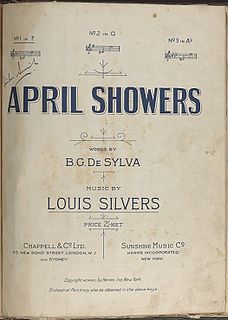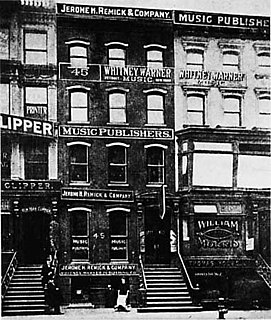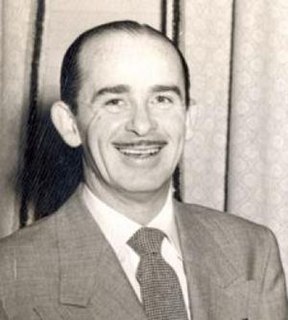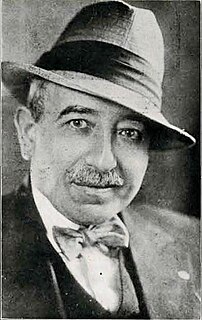Related Research Articles
Fred Fisher was a German-born American songwriter and Tin Pan Alley music publisher.

George Gard "Buddy" DeSylva was an American songwriter, film producer and record executive. He wrote or co-wrote many popular songs and, along with Johnny Mercer and Glenn Wallichs, he co-founded Capitol Records.

Tin Pan Alley was a collection of music publishers and songwriters in New York City which dominated the popular music of the United States in the late 19th and early 20th centuries. It originally referred to a specific place: West 28th Street between Fifth and Sixth Avenues in the Flower District of Manhattan; a plaque on the sidewalk on 28th Street between Broadway and Sixth commemorates it. In 2019, the New York City Landmarks Preservation Commission took up the question of preserving five buildings on the north side of the street as a Tin Pan Alley Historic District. The agency designated five buildings individual landmarks on December 10, 2019, after a concerted effort by the "Save Tin Pan Alley" initiative of the 29th Street Neighborhood Association. Following successful protection of these landmarks, project director George Calderaro and other proponents formed the Tin Pan Alley American Popular Music Project to continue and commemorate the legacy of Tin Pan Alley with various advocacy and educational activities.

Ned Washington was an American lyricist born in Scranton, Pennsylvania.
Irving Harold Mills was an American music publisher, musician, lyricist, and jazz artist promoter. He sometimes used the pseudonyms Goody Goodwin and Joe Primrose.

Swing Easy! is the eighth studio album by Frank Sinatra. It was released in 1954 as a 10" album and consisted of only eight songs, as each side of the record only allowed approximately fourteen minutes of music.
Frederick Emil Ahlert was an American composer and songwriter.
James Brockman was an American songwriter. Born in Russia, he emigrated to New York by himself at the age of 9 or 10. His given name was Jacob Brachman but he changed the spelling of the last name because it was mis-pronounced and the rest of the family followed with the change.
Gerald Marks was an American composer from Saginaw, Michigan. He was best known for the song "All of Me" which he co-wrote with Seymour Simons and has been recorded about 2,000 times. He also wrote the songs "That's What I Want for Christmas" for the film Stowaway starring Shirley Temple, and "Is It True What They Say About Dixie" recorded by Al Jolson and Rudy Vallee.
Maceo Pinkard was an American composer, lyricist, and music publisher. Among his compositions is "Sweet Georgia Brown", a popular standard for decades after its composition and famous as the theme of the Harlem Globetrotters basketball team.
"Down Among the Sheltering Palms" is a popular song.
Bob Rothberg was a Tin Pan Alley songwriter and lyricist. ASCAP 1936. Educ: New York public schools 1915; DeWitt Clinton High School, New York 1919; accountancy and law, New York Law School, Bachelor of Laws 1928. Educated in music and violin with private instructors. Rothberg is interred at United Hebrew Cemetery on Staten Island.
"Alabamy Bound" is a Tin Pan Alley tune written in 1924, with music by Ray Henderson and words by Buddy DeSylva and Bud Green. It was popularized by Al Jolson and included in the musical Kid Boots, where it was sung by Eddie Cantor. Successful recordings of the song were released in 1925 by Paul Whiteman, Isham Jones and Fletcher Henderson (instrumentals), as well as Blossom Seeley, whose vocal version reached number 2 on the charts. The song has sold over a million copies of sheet music and has been included in several films over the years.

Leopold Feist, in 1897 founded and ran a music publishing firm bearing his name. In the 1920s, at the height of the golden age of popular music, his firm was among the seven largest publishers of popular music in the world. Leo Feist, Inc., ran until 1934.
Waterson, Berlin & Snyder, Inc. was, during the 1920s, one of the largest music publishers of popular sheet music in the country. The firm was based in New York City. What began as the Ted Snyder Company in 1908 evolved into Waterson, Berlin & Snyder, Inc., in 1917 when its founder, Ted Snyder (1881–1965), took on two partners – Henry Waterson (1873–1933) and Irving Berlin (1888–1989). Berlin had been Ted Snyder's staff lyricist since 1909.
Chester Conn(néMaster Chester Cohn; April 14, 1894 in San Francisco, California – April 4, 1973 in Flushing, Queens) was an American composer of popular music and music publisher.
Al Piantadosi was an American composer of popular music during the heyday of Tin Pan Alley. He started out as a saloon and vaudeville pianist and rapidly flourished as a songwriter. For about ten years he was an independent music publisher.
Clarence Gaskill was an American composer and lyricist active during the 1920s to early 1930s. His most well-known songs include, Doo-Wacka-Doo (1921). I Can't Believe That You're in Love with Me (1926), and Prisoner of Love (1932). His first hit came in 1919 with I Love You Just the Same, Sweet Adeline.
Robert A. King was a prolific early twentieth century American composer, who wrote under pen names including the pen names, Mary Earl, Robert A. Keiser, and Betty Chapin.
References
- 1 2 Joel Whitburn (1996). The Billboard Book of Top 40 Country Hits. Billboard Books. p. 28. ISBN 0823076326.
- ↑ "The Year's Top Country & Western Records" (PDF). The Billboard. January 13, 1951. p. 19. Retrieved November 30, 2020.